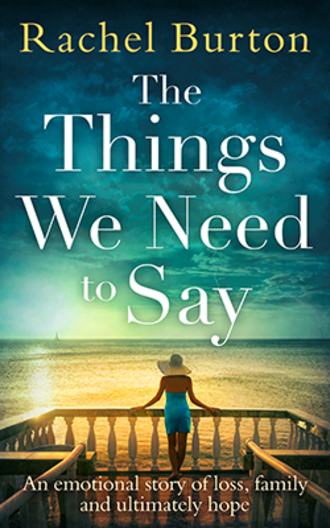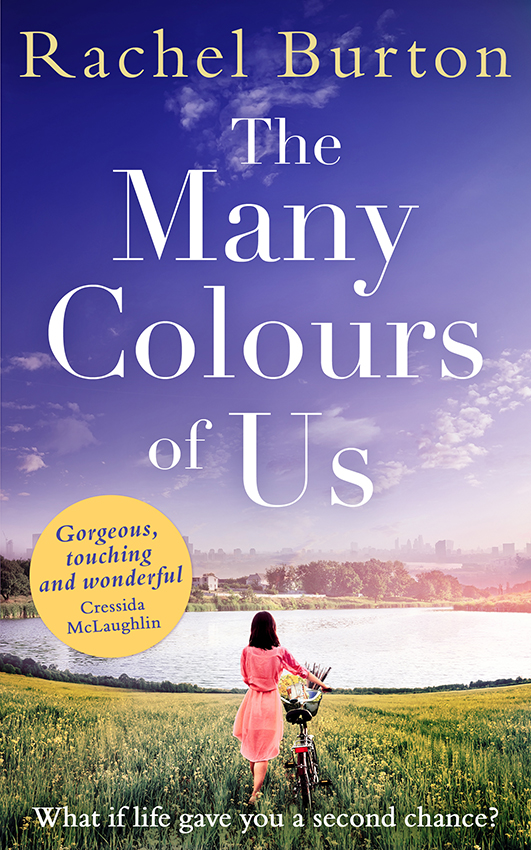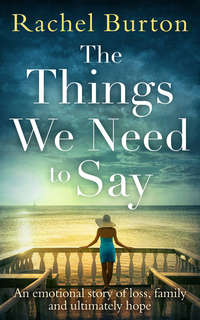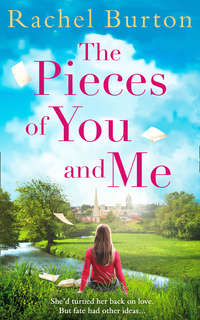
Полная версия
The Many Colours of Us: The perfect heart-warming debut about love and family


What if your life was built on lies?
Julia Simmonds had never been bothered about not knowing who her father was. Having temperamental supermodel, Philadelphia Simmonds, as a mother was more than enough. Until she discovers she’s the secret love-child of the late, great artist Bruce Baldwin, and her life changes forever.
Uncovering the secrets of a man she never knew, Julia discovers that Bruce had written her one letter, every year until her eighteenth birthday, urging his daughter to learn from his mistakes.
Julia begins to dig deeper into the mysterious past of her parents, opening up a history she’d never have imagined, but as she discovers the truth she needs to decide if she is willing to forgive and forget…
The Many Colours of Us
Rachel Burton

Copyright

An imprint of HarperCollinsPublishers Ltd.
1 London Bridge Street
London SE1 9GF
First published in Great Britain by HQ in 2017
Copyright © Rachel Burton 2017
Rachel Burton asserts the moral right to be identified as the author of this work.
A catalogue record for this book is available from the British Library.
This novel is entirely a work of fiction. The names, characters and incidents portrayed in it are the work of the author’s imagination. Any resemblance to actual persons, living or dead, events or localities is entirely coincidental.
All rights reserved under International and Pan-American Copyright Conventions. By payment of the required fees, you have been granted the non-exclusive, non-transferable right to access and read the text of this e-book on-screen. No part of this text may be reproduced, transmitted, downloaded, decompiled, reverse engineered, or stored in or introduced into any information storage and retrieval system, in any form or by any means, whether electronic or mechanical, now known or hereinafter invented, without the express written permission of HarperCollins.
E-book Edition © April 2017 ISBN: 9780008243920
Version: 2018-03-14
RACHEL BURTON
Rachel Burton has been making up stories since she first learned to talk, prodigiously early. In 2013 she finally started making one up that was worth writing down.
She has a BA in Classics and an MA in English and has never really known what to do when she grew up. She has worked as a waitress, a legal secretary, a yoga teacher and a paralegal. She never quite made it to law school.
She grew up in Cambridge and London but now lives in Leeds with her boyfriend and three cats. The main loves of her life are The Beatles and very tall romantic heroes.
Visit Rachel at rachelburtonwriter.com
Contents
Cover
Blurb
Title Page
Copyright
Author Bio
Author’s Note
Acknowledgements
Dedication
Chapter 1
Chapter 2
Chapter 3
Chapter 4
Chapter 5
Chapter 6
Chapter 7
Chapter 8
Chapter 9
Chapter 10
Chapter 11
Chapter 12
Chapter 13
Chapter 14
Chapter 15
Chapter 16
Chapter 17
Chapter 18
Chapter 19
Chapter 20
Chapter 21
Chapter 22
Chapter 23
Chapter 24
Chapter 25
Chapter 26
Chapter 27
Chapter 28
Chapter 29
Chapter 30
Chapter 31
Chapter 32
Chapter 33
Chapter 34
Chapter 35
Edwin and Julia’s Playlist
Excerpt
Endpages
About the Publisher
AUTHOR’S NOTE
The house in Campden Hill Road, W8 is based on a real house which, during the 1980s and 1990s was owned by friends of my parents. During my teenage years that was the house from which I first learned Philadelphia Simmonds’ art of retail therapy, where I first heard Pink Floyd’s Dark Side of the Moon, where I first read Bleak House. In a way Julia was born in that house. I’m glad she finally came out to play.
ACKNOWLEDGEMENTS
Firstly, a big thank you to everyone at HQ for picking my book out of the slush pile and making a childhood dream come true on a train between Bristol and Bridgwater one cold November afternoon. Particular thanks to my editors, Victoria and Hannah, for being able to understand what’s going on in my brain better than me.
To Cesca Major, who read a very early draft of The Many Colours of Us and encouraged me to go on and to “make the solicitor hotter”. I hope Edwin lives up to your expectations!
To Jo Murray-Dry, without her encouragement and relentless nagging this book would probably still be sitting on my hard drive, lonely and unread.
To Andy Cowan for explaining, in words of one syllable so even I could understand, the purpose and structure of a synopsis.
To Hayley Webster for long chats about Bert the Chimney Sweep.
To Ian Mountford for coming up with Creamadelica – probably best not to know where that came from but most welcome!
To Caroline, Rachel and Gillian – the probate team at Birketts LLP in Cambridge. It was a joy to work with you for six months and thank you for answering all my weird probate questions without actually knowing they were going in a book. Any mistakes are entirely of my own making. The probate process, especially in an estate the size of Bruce Baldwin’s is desperately slow and I have sped it up considerably to maintain the pace of the narrative.
To everyone on Twitter who has ever offered me words of encouragement when I thought I would never get to type “The End”. There are way too many of you to mention but you know who you are.
To my mum and dad, who always taught me you can do anything you want if you just work hard enough. My mum died the day after I finally typed “The End” and never got to read the final version, but without her encouragement I’d never had written the beginning.
And last, but certainly not least, to my beloved Drew. Thank you for feeding me, cleaning the house and looking after the cats while I lived in an imaginary world all summer. And thank you for answering me seriously every time I asked the question; ‘What would Edwin Jones do?’
To Mum, Liz, Nana – shine on crazy diamonds
6th June 2001
My dearest daughter,
And so, you are eighteen.
I wish I could see you and tell you how proud I am of you. I wish I could tell you how excited I was when I heard that you’d been offered a place at Cambridge. I wish I could be with you when you open your A Level results. I wish I could see the look on your face when you get the grades I know you deserve.
I saw you the other day, my beautiful girl, walking down Kensington High Street laughing with a friend. Tall and tanned, dark hair tumbling down your back. You looked so carefree, so happy, as though nothing could touch you. You looked exactly like your mother used to, when I first met her.
Sometimes, though, when the light catches you in a certain way, you have a look of me about you, as though a wisp of the young man I used to be lives on within you, looking out for you.
I want to remind you, now you are all grown up, that your mother has always loved you too. Life hasn’t been kind to her; or rather the life she chose hasn’t been as kind to her as she’d hoped. She had to give up a lot when she had you, and everything she did, she did because she was trying to do the right thing by you. I hope one day, when you hear the truth, you will be able to forgive her. Forgive us both.
This will be the last letter I write to you. I hope she will let you read this one. I hope she will let you ask questions and hear the story you need to hear. The story of you. And if she doesn’t I hope that one day you will get curious, wonder where you came from and come and find me.
Until that time, I wish you nothing but happiness in everything you do. Study hard but play hard too. Life is short and you never know what tomorrow might bring.
Despite everything I have always loved you and always will.
Happy Birthday, Princess.
Your Father
To: j_simmonds83@gmail.com
From: ecj@jonescartwright.co.uk
Sent: Thur, 06 Jun 2013 at 18.32
Subject: Re: Inheritance – Private & Confidential
Dear Ms Simmonds
Thank you for your email of yesterday’s date.
It is important that we meet as soon as possible to discuss the matter of your recent inheritance further and I suggest a meeting at 2.30 p.m. on Monday 10th June 2013 at my offices as detailed below.
Please ask for me at reception.
I look forward to meeting you.
Regards
Edwin Jones
Partner
Jones & Cartwright Solicitors, 55 Park Lane, London
Chapter 1
‘I’m Julia Simmonds,’ I say, as I walk up to the reception desk at Jones & Cartwright Solicitors. ‘I’ve got an appointment with Edwin Jones.’
‘Take a seat,’ the woman behind the desk replies. She has steel-grey hair and a stern expression and peers at me over half-moon glasses. ‘Mr Jones will be down shortly.’
I perch on the edge of a big brown leather sofa. It’s so old and worn out it looks as though it will swallow me up if I sit on it properly. I’m sweating already and I can feel my hair curling around my temples. The weather forecast said that today will be the hottest June day since records began. There is no air-conditioning in Jones & Cartwright. I fiddle with the strap of my bag and stare at the floor.
Two black Prada shoes appear in front of my eyes. You don’t grow up in the same house as Philadelphia Simmonds without being able to recognise Prada when you see it. They are attached to two long pinstriped legs. Very long pinstriped legs. Someone who I can only presume to be Edwin Jones is smiling at me, his shirtsleeves rolled up past the elbows, his tie loosely knotted. He’s a lot younger than I imagined. And a lot more handsome.
‘Miss Simmonds,’ he says. I nod, unable to find my voice. He looks hot. In more ways than one.
‘Would you like to follow me?’
I stand up and realise how tall he is – a good five or six inches taller than me. I could have worn heels, I think, pointlessly. At 5’10” I rarely get the chance to wear heels without feeling slightly ridiculous. I follow him up a wide spiral staircase and along a wood-panelled corridor. He holds open the door to his office. His name is emblazoned on it in gold plate.
‘Take a seat, Miss Simmonds,’ he says as we walk in.
‘Julia, please,’ I say, finally finding my voice.
‘Julia,’ he repeats. He turns on a pedestal fan and opens his window a little wider. ‘Thank you for coming down from Cambridge to meet with me. I’m sorry if it’s inconvenienced you at all but this is a little…um…sensitive and I felt it should be done face to face.’
It’s unbelievably hot in here and I can feel the stray hairs at the nape of my neck getting damp. The walls are wood panelled like the corridor, making the room dark, and I can’t decide if that helps or hinders with the heat.
‘That’s OK.’ I smile, trying very hard not to show that it has inconvenienced me. ‘It’s less than an hour on the train.’
We both sit down on leather armchairs either side of a low coffee table, rather than at his overwhelming leather-topped desk. This whole room reminds me of a scene from a Dickens novel. It’s tremendously old-fashioned and nothing like the sleek chrome and glass air-conditioned office I work in.
He pours me a glass of iced water out of a jug on the table and asks if I want any tea or coffee. I shake my head. I just want to get on with things now.
He picks up a folder of papers and looks at me. He really is quite beautiful. It’s so hot in here that I feel a bit odd, a little light-headed. I can’t quite catch my breath. I take a big gulp of water and I remind myself I’m here to inherit some horrible artefact and then I’ll never see these offices or Edwin Jones again.
‘You look exactly like your mother,’ he says, still looking at me. ‘I hope you don’t mind me saying that.’
I shrug. ‘No, everybody comments on it.’
‘I’ve known her a long time,’ he goes on, ‘since I was a child actually. My father was her lawyer originally but he retired a few years ago. Her numerous papers have been handed to me.’ He pauses again. I wonder why Mum didn’t say anything if he’s known her for years as he claims. This is all very odd.
Just as I think I’m going to have to fill the silence with something inane he begins to speak.
‘The truth is, Miss Simmonds…um…Julia, I don’t really know where to start with this. I asked Philadelphia to tell you herself but she insisted I do it.’
‘Typical,’ I say.
‘Does the name Bruce Baldwin mean anything to you?’
I stare at him, slightly taken aback. ‘Up until last week I’d never heard of him,’ I say, ‘but over the last few days I’ve heard his name several times. He died earlier in the year I’m told.’
He pauses again. I watch him take a breath. He looks as though he is about to apologise for something but stops himself.
‘Bruce Baldwin was your father.’
*
When I first received an email from Edwin Jones telling me I was the benefactor of an inheritance, I imagined the worst. My mother’s friends have been dropping like flies recently, the hedonistic 70s finally catching up with them, and they do like to remember ‘little Julia’ in their wills. The worst inheritance so far has been an elephant’s foot umbrella stand that turned out to have been made from an actual elephant’s foot. My housemate, Pen, made me sell it on eBay. It wasn’t worth as much as we’d hoped.
I had phoned my mother about it, of course. She always seems mildly surprised when I call.
‘How are you?’ I asked.
‘Oh, fine, dear,’ she replied. She always says this, whether she’s fine or not.
‘Look, Mum, I was thinking of coming down to London to see you next week. Monday afternoon maybe?’ I was testing the waters. I was never sure if she liked having me around or not.
‘The big smoke calling you back already?’ she asked. She knows I can never stay away for very long.
‘Well a solicitor called actually,’ I replied. ‘Does the name Edwin Jones mean anything to you? Or a firm called Jones & Cartwright?’
My mother was suddenly uncharacteristically quiet.
‘Mum?’
‘Um…it may ring a bell,’ she finally admitted.
‘Well this Edwin Jones says I’ve inherited something and I just wanted to check…’
‘Edwin is Cedric’s son,’ Mum interrupted in a vague, spaced-out kind of way. ‘And Bruce died of course.’
‘Bruce who?’
‘Bruce Baldwin.’ After a long pause, in which I waited for her to elaborate she said, ‘I must go now, darling. I suppose I’ll see you on Monday. You have a key?’
‘Yes, Mum, but listen…’
‘Well, let yourself in.’
‘Mum?’ But she’d already gone.
So Edwin Jones telling me he’s known her since he was a child just didn’t add up.
I had asked Pen if the name Bruce Baldwin meant anything to her.
‘As in Bruce Baldwin the world-renowned artist?’ she replied.
‘I guess. I’ve never heard of him.’
‘Really, Julia, you can be such a philistine sometimes. He died a few months ago; his obituary was in the Times.’
‘Did you read it?’
‘I did actually. It’s quite a poor-boy-made-good story. He was born into a Yorkshire mining family, managed to get into grammar school where the art teacher discovered his talent and off he went to St Martin’s, although I suspect it was all a lot more difficult and arduous than I’ve just made it sound! Apparently, he spent years in and out of rehab before he was finally recognised in the art world. I should think the obituary is still online if you want it. Why anyway?’
‘Mum,’ I replied. ‘When I asked her about Edwin Jones and the inheritance she started going on about Edwin’s father and Bruce Baldwin. I can’t really see how it’s all connected.’
‘Well you know your mother, Julia, nothing if not vague. You’ll find out on Monday anyway.’
*
So here we are on Monday and Edwin Jones is looking at me across the table. Neither of us has spoken for several minutes.
He breaks the silence first. ‘Julia, are you OK? Can I get you anything?’
I shake my head. Edwin looks vaguely uncomfortable. He is still holding the folder of papers. I wonder what they say.
‘I never knew who my father was,’ I begin, although I suspect he knows this already. ‘My mother always claimed she had forgotten, which was rubbish of course but if you know my mother you know that sometimes it’s impossible to get anything out of her.’
Edwin smiles. That smile tells me he knows my mother well.
‘I think you probably need to tell me everything you know,’ I say.
He sighs, putting the folder down on the coffee table and leaning back in his chair, staring at the ceiling for a moment. Whatever he has to tell me, he really doesn’t want it to be his job. Finally, he looks at me, placing his hands on his knees. I realise I can’t look at him so I focus on his hands as he begins to tell me what can only be described as the story of me.
‘My father, Cedric Jones, dealt with your mother’s legal affairs when she arrived from New York in 1973,’ he tells me. ‘This firm worked closely with your mother’s agency so she wasn’t the only model on the books. It’s hard to believe that this stuffy old place was quite hip and bohemian in its time.’ He looks around at the endless wood panels, as though he would rather be anywhere else than here. He’s not the only one.
‘Here’s what I know,’ he says, as I keep looking at his hands. They are lovely hands, well looked after, big, slightly tanned. ‘Philadelphia Simmonds and Bruce Baldwin had an on-off relationship throughout the 70s and early 80s. You were born towards the end of that relationship and for whatever reason, shortly afterwards they went their separate ways. I know that your mother never told you about Mr Baldwin but I can tell you that they were certainly in contact throughout your life, although I don’t believe your father saw you very often.’
He pauses. His hands are going in and out of focus and I feel very hot again. I look up and use every ounce of energy to concentrate. I have a thousand questions but don’t have the energy to ask any of them.
‘As you may know, after you were born your mother lost some of her lucrative contracts…’
‘All of them apparently,’ I interrupt. ‘And don’t I know it.’
‘Yes, well…’ Edwin looks down at his own hands. Thank goodness they’re there or what would we have to focus on during these awkward moments. ‘In a nutshell, she ran out of money sometime in the early 90s. She remortgaged her house several times but by 1993 she was in serious financial difficulty. It was around that time that Mr Baldwin, your father, bought the house off her.’
I’m paying attention now. My mother hadn’t owned the house since I was ten? My father owned it? And she never thought to tell me? Because, of course, she’d ‘forgotten’ who my father was.
‘From that point on my father became Mr Baldwin’s lawyer too. Mr Baldwin set up his will not long after buying the house. In it he has left everything to you.’
‘Everything?’ I ask, not sure what everything entails.
‘A trust has been put to one side for your mother but otherwise, yes, everything. The house in Campden Hill Road, Bruce’s flat in Notting Hill, his studio in East London and, of course, his entire estate. Basically,’ he concludes, bringing the palms of his hands together, ‘you’re a very rich woman.’
I stand up and Edwin looks up at me. His eyes are very blue.
‘I think I need to go now,’ I say. I feel as though the wood panelling is going to close in on me if I don’t get out soon.
He stands up quickly, opening the door and ushering me through.
‘I completely understand this must come as a huge shock to you,’ he says as he leads me back down to reception. ‘There is still a lot we need to go through but perhaps you should go home and talk to your mother. We can meet tomorrow or later in the week if you prefer?’
‘Um…later in the week maybe,’ I reply.
‘Muriel will fix an appointment,’ he says, turning to the grey-haired woman at the reception desk. ‘How am I fixed for Friday?’ he asks her.
She books an appointment and Edwin Jones turns back to me, shakes my hand.
‘Until Friday,’ he says.
Chapter 2
‘Mum, it’s me,’ I call as I let myself into my mother’s house on Campden Hill Road. Actually no. It’s my house now. I shake my head, unable to take it in.
No reply.
‘Mum,’ I shout up the stairs. Still nothing. I check the rooms of the ground floor and head down into the basement kitchen.
The note sits in the middle of the kitchen island. The island that is used for nothing other than making and drinking coffee or gin and tonic, depending on the time of day. I have never seen my mother cook.
Darling girl, had to pop to Manhattan for a few days. Enjoy yourself and see you another time, Love Mom xxx
Forty years in England and she still insists on spelling like an American. And who the hell ‘pops’ to Manhattan. It doesn’t take a genius to work out that she’s avoiding me now Edwin has told me everything he knows.
My relationship with my mother has been fractious for years, mainly due to her refusal to tell me who my father is. But despite this, every few months the umbilical pull back to West London is too strong to resist. I have long since lost count of the number of times I’ve made the journey from Cambridge to Kensington; train to Kings Cross, the fast one if I can get my times right and then the Circle line going west and south, looping through Baker Street and Bayswater, stations I’ve travelled through for half of my life but never got out at, until my stop, High Street Kensington.
There are probably quicker ways, but I love the Circle line. It was the first tube I ever remember travelling on and the first I ever travelled on alone. It’s as much my home as the streets of Kensington above and there’s something about its circuitous nature that appeals to me. There is no end of the line here, just a sensation of going around and around until you find what you are looking for. I’m probably the only person in London who has warm feelings about the Circle line. Most people find it as useful as a chocolate teapot.




